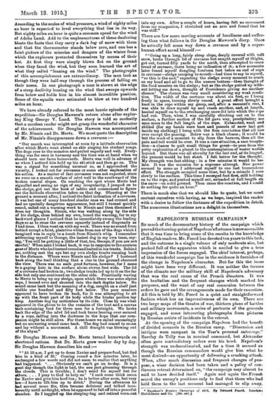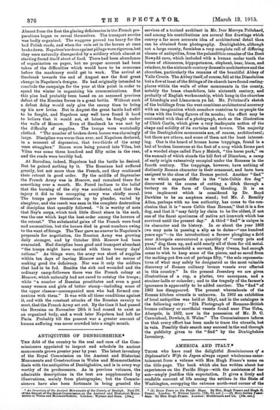NAPOLEON'S RUSSIAN CAMPAIGN.*
SO much of the documentary history of the campaign which proved the turn ing.point of N'apoleon's fortunes isnow accceaible that it was time to bring some of the results to the knowledge of English readers. Mr. Foord has devoted ten years to this task, and the outcome is a single volume of only moderate size, hut packed full of the apparatus which is needed to give a true bnpreesion of the forces engaged. The chief interest, perhaps, of this wonderful campaign lies in the evidence it furnishes of the change in Napoleon's character. But for this the issue might have been very different. It was neither the terrors of the climate nor the military skill of Napoleon's adversary that was the real cause of the French disasters. It way the hesitation and the frequent changes which marked his purposes, and the want of any real connexion between the orders he gave and the arrangeruenta made for their execution. All this is told by Mr. Foord in a quiet and straightforward fashion which has an impressiveness of its own. There are two large maps of the theatre of war, thirteen plans of battles and military movements, a series of portraits of the generals engaged, and some interesting photographs from picture. by Russian artists of incidents in the retreat.
At the opening of the campaign Napoleon bed the benefit of divided counsels in the Russian camp. "Dissension and intrigue were rampant in the Tsar's personal rafeereee." Barclay de Telly was in nominal command, hat Alexander often gave contradictory orders over his bead. Napoleon's strength was underestimated, and for a time it seemed as though the Russian commanders would give him what he most desired—an opportunity of delivering a crushing attar*, When, after much discussion and frequent changes of pur- pose, a wiser decision had been taken and a policy of con- tinuous retreat determined on, "the campaign may almost he raid to have decided itself." Again and again the French seized the enemy's positions only to find that those who had held them to the last moment had managed to slip away.
• 86 *lames Russian Coeval's Ina Da Bier& less& 14.1San Bnteldssen end Co. Ilea. wit)
Almost from the first the glaring deficiencies in the French pre- parations began to reveal themselves. The transport service was badly organized. The waggons proved too heavy for the bad Polieh roads, and when the rain set in the horses at once broke down. Napoleon's orders against pillage were rigorous, but they were naturally disregarded by a soldiery which almost at starting found itself short of food. There had been abundance of organization on paper, but no proper account had been taken of the difficulties which would have to be overcome before the machinery could get to work. The arrival at Smolensk towards the end of August saw the first great change in Napoleon's designs. He had originally intended to conclude the campaign for the year at this point in order to spend the winter in organizing his communications. But this plan had probably been bused on an assumed previous defeat of the Russian forces in a great battle. Without such a defeat delay would only give the enemy time to bring up his new levies. But in August the great battle had still to be fought, and Napoleon may well have found it hard to believe that it would not, at latest, be fought under the walls of Moscow. Even at Smolensk he was met by the difficulty of supplies. The troops were wretchedly clothed. "The number of broken-down horses was alarmingly large. Discipline was worse than ever, and Napoleon declared, in a moment of depression, that two-thirds of the army were stragglers." Stores were being poured into 'Vilna, but Vilna was some three hundred and fifty miles in the rear, and the roads were terribly bad.
At Borodino, indeed, Napoleon had the battle he desired. But he gained nothing by it. The Russians had suffered greatly, but not more than the French, and they continued their retreat in good order. By the middle of September the French Army was in Moscow, and remained there for something over a month. Mr. Foord inclines to the belief that the burning of the city was accidental, and that the injury it did to the occupying army was chiefly moral. The troops gave themselves up to plunder, varied by slaughter, and the result was seen in the complete destruction of discipline that speedily followed. "It is worthy of note that Ney's corps, which took little direct share in the sack, was the one which kept the beat order among the horrors of the retreat." The substantial gains of the French were food and ammunition, but the horses died in great numbers owing to the want of forage. The Tsar gave no answer to Napoleon's proposals for negotiation, the Russian Army was growing daily stronger, and by October 20th Moscow had been evacuated. Had discipline been good and transport abundant "the troops might have carried with them twenty days' rations." As things were, the army was short of supplies within ten days of leaving Moscow and had no means of making good the deficiency. Nor was it only the soldiers that had to be fed. Besides the sick and wounded and the ordinary camp-followers there was the French colony at Moscow, which naturally had not cared to outstay the troops ; while "a number of Russian prostitutes and even a good many women and girls of better stamp—including some of the upper classes—accompanied men who had formed con- nexions with them." It was with all these conditions against it, and with the constant attacks of the Russian cavalry to meet, that the French Army set out. By the time it had passed the Beresins. on November 28th it had ceased to exist as an organized body, and a week later Napoleon had left for Paris. Probably till the present war s. greater amount of human suffering was never crowded into a single month.



































 Previous page
Previous page